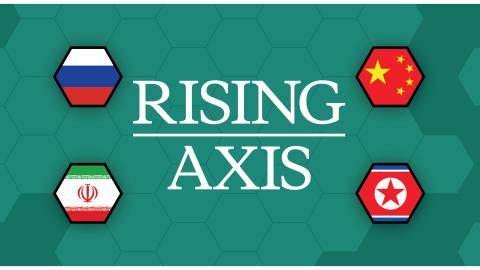Rising Axis showcases the depth of Hudson’s analysis on how America and its allies can compete with and defeat the axis of aggressors.
To receive the newsletter in your inbox, subscribe here.
For decades, North Korea has been a pariah state mainly known for its small but significant nuclear capability. But as the axis of aggressors grows closer, Pyongyang is becoming a greater threat to the United States and the West.
As Beijing props up Pyongyang with diplomatic cover and illicit economic support, North Korean missiles, shells, and even troops support Russia’s war effort in Ukraine. According to South Korean President Yoon Suk Yeol, who spoke with Hudson Japan Chair Kenneth Weinstein at the 2024 North Atlantic Treaty Organization Public Forum, North Korea’s role in this axis has underscored the connection between the Euro-Atlantic and Indo-Pacific—and strengthened cooperation between NATO and the alliance’s Pacific partners.
Bottom Line
“The missiles and the artillery shells that North Korea is supplying to Russia will prolong the war in Ukraine, and Russia’s potential military technology and economic assistance to North Korea in return threatens peace on the Korean Peninsula and in the northeast Asian region.”
— South Korean President Yoon Suk Yeol
Facts and Analysis
1. China props up the rogue regime in North Korea, tacitly endorsing Pyongyang’s nuclear threats.
- China keeps the pariah state afloat through economic support, and Beijing runs interference for Pyongyang when the United Nations tries to issue statements or increase sanctions in response to North Korea’s repeated violations, writes Rebeccah Heinrichs.
- China’s unwillingness to restrain North Korea’s growing nuclear capability is another example of Beijing’s antagonism toward the West, writes H.R. McMaster in The Atlantic.
- McMaster also reminds that, according to former President Donald Trump, China could solve the problem with North Korea “in two seconds” because North Korea depends on China for energy, goods, and stability.
- The Obama administration had hoped that China’s inclusion in the international order would encourage it to “play by the rules.” Rather, China exploited the free-trade system and continued to support pariah states like North Korea and Iran.
For more, read McMaster’s op-ed “What Trump Got Right about National Security.”
2. North Korea is a major supporter of Russia’s war in Ukraine, and Russia supports North Korea’s advanced rocket capabilities.
- In September 2023, Vladimir Putin met Kim Jong Un and pledged to overhaul Pyongyang’s space program. Just two months later, North Korea overcame past failures to successfully send a reconnaissance satellite into orbit, write Hudson’s Peter Roughand Mike Pompeo.
- In the aftermath of this meeting, Hudson’s Can Kasapoğluanalyzed that North Korea could provide Russia with crucial Russian-compatible armaments, cyber warfare assets, and other special forces capabilities. Recent reports even suggest that North Korea has sent soldiers to fight on the front lines of Russia’s invasion.
- Beyond the shipment of military equipment, the Moscow-Pyongyang axis threatens peace in Asia and internationally, writes Patrick Cronin. He argues that Russia–North Korea–China collaboration should bolster trilateral cooperation among the United States, South Korea, and Japan.
3. The North Korean nuclear program weakens the US-led order by threatening American allies and harming the perception of America’s global influence.
- North Korea, alongside other members of the axis, is increasingly comfortable using nuclear escalation threats to shape US perceptions. Washington should focus on building military capabilities that demonstrate political resolve and add credibility to its deterrence.
- Kim’s credible nuclear threats reinforce Xi Jinping’s message that the United States is in decline and cannot provide the protection it promises, and that China should replace it as the preeminent power.
- North Korea could export its nuclear capability to assist other rogue regimes. “What’s really important to recognize about North Korea is that they’ve never met a weapon that they didn’t try to sell to somebody,” warned McMaster during a Hudson event.














